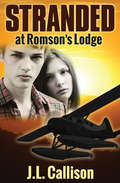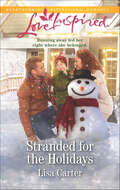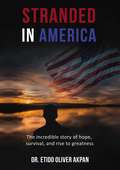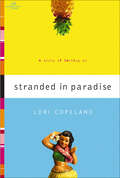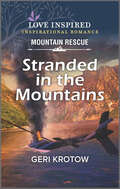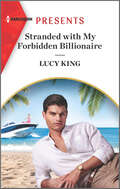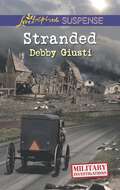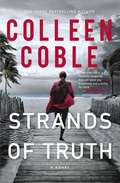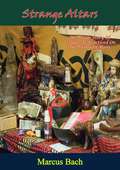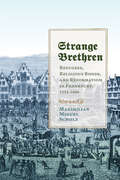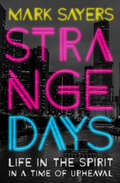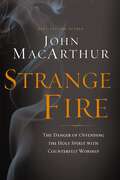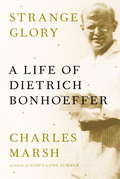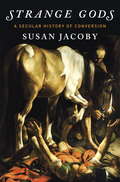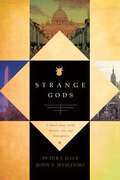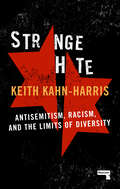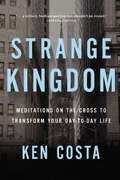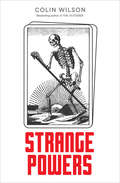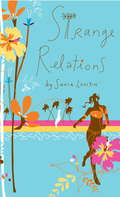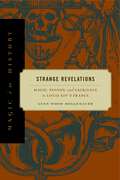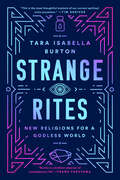- Table View
- List View
Stranded at Romson's Lodge
by J. L. CallisonWhen a kidnapping plots goes awry, two teenagers fight to stay alive in the remote and dangerous wilds of upstate Maine. Suddenly snatched from the safety of their suburban lives, everything changes is an instant for high school seniors, Jed Romson, son of a wealthy industrial magnate, and his friend Lizzie. When their abductor&’s single-engine bush plane crashes in a dense, forested middle of nowhere, Jed and Lizzie find temporary safe haven in an isolated rustic cabin. But they&’re also fifty miles from civilization. With provisions running low, contact to the outside world cut off, and chance of rescue becoming less likely with each new sunset, they must learn to fend for themselves as the threatening and unpredictable elements of nature close in. A modern-day Swiss Family Robinson told through the eyes of two resourceful young souls-turned-frontier-survivors, Stranded at Romson&’s Lodge is a thrilling and inspiring adventure of courage, friendship, loyalty, and fighting the odds.
Stranded for the Holidays
by Lisa CarterRunning away led her right where she belonged.A new mom for Christmas?She’s everything they’ve wished for.Runaway bride AnnaBeth Cummings needs shelter for the holidays when a blizzard leaves her stranded, and rancher Jonas Stone’s happy to help. But his son’s been wishing for a mommy for Christmas, and town matchmakers are convinced AnnaBeth and Jonas are perfect for each other. As the storm clears, city girl AnnaBeth will have to decide: does her heart now belong in the country?
Stranded in America: The incredible story of hope, survival, and rise to greatness
by Dr. Etido AkpanClever, an ambitious teenager, dreams of one day leaving Africa to study in America. He is accepted at a university in Tennessee where he will study business but is denied a visa ten times. Upon arrival in the United States, he experiences huge culture shock. Four weeks into classes, he learns his sponsor is unable to support him financially. Because he is on a student visa, he cannot work off campus and does not qualify for loans and financial aid opportunities. He goes without eating on many occasions. The physical and emotional pain are so severe that he wants to crawl out of his skin. But Clever is so determined to succeed, this hardship does not stop him. When graduation day comes, Clever and his girlfriend, Ayanna, graduate with honors. He is the valedictorian and presents a moving speech. They break up as they both face uncertain futures. Dealing with his dad&’s loss right after graduation is daunting for him, and the feeling of abandonment is intensified when he cannot make it home. A year after graduate school, Clever meets Rosita. He marries abruptly, and it ends on a sad note. Despite his struggles, he neither gives up nor loses faith in God's plans for him. In his heart, Clever knows he will succeed. After these losses, he embarks upon a quest to find his first love, and he unexpectedly meets Ayanna again. They rekindle their romance, and the stage is set for new adventures.
Stranded in Paradise: A Story of Letting Go
by Lori CopelandA woman finds herself once more—as well as a wonderful new man--on a Hawaiian vacation in this inspirational romantic comedy. Tess Nelson is poised to take a well-deserved step up the corporate ladder when she's suddenly fired. With no job and nothing to fill her days--just a nonrefundable ticket for a trip to Hawaii--Tess decides a tropical vacation is just what she needs. But Tess's journey to paradise is a disaster from the beginning. A sprained ankle at the airport. Then there's the lost contact lens and the lost luggage, the lightning storm at a luau, and the hotel fire. Not to mention the approaching hurricane. And the attractive, annoying young man who keeps crossing her path--and really shaking her up. All Tess wants to do is get her life back under control. But God, it seems, has something else in mind--like opening her heart to everything her life could be.
Stranded in the Mountains (Mountain Rescue)
by Geri KrotowThey survived the crash…Now can they escape the wilderness? Part-time treasure hunter Daniel Sturges&’s secret assignment was simple—find a wrecked WWII B-17 and recover the artifacts inside. But now he&’s stranded with fellow crash survivor Cassie Edmunds, who's searching for the same plane, and they&’ll have to trust one another with their lives. With temperatures falling in treacherous terrain, will they risk everything for the missing wreckage or discover something more valuable between them? That is, if they can stay alive...
Stranded with My Forbidden Billionaire
by Lucy KingFirst, she needs his expertise. Then she&’ll test his every boundary…in this enemies-to-lovers romance by Lucy King! My heart is off-limits… …but our attraction is off the charts! My brother&’s best friend, Nick Morgan, has always hated me. Then I won millions in the lottery. As my past has left me with no one to trust, superrich financier Nick&’s the only person I can rely on to help me. And he&’s demanded I join him in paradise…on his Indian Ocean island! But no sooner I arrive than a tropical storm has us stuck together—indefinitely! My awareness of the hostility between us that&’s kept Nick out-of-bounds morphs into a dangerously irresistible desire that I never saw coming…From Harlequin Presents: Escape to exotic locations where passion knows no bounds.
Stranded: Stranded Untraceable Dangerous Inheritance (Military Investigations #7)
by Debby GiustiAMISH COUNTRY REFUGE Colleen Brennan has one goal-take down her sister's killer. But chasing after evidence leaves her in the path of a tornado and stranded in an Amish community. With the killer nearby, Colleen must depend on the kindness of Special Agent Frank Gallagher. Although the army officer is recuperating from a battlefield injury, he wants to help the beautiful woman he rescued from the tornado's fury. He can tell she's hiding something important. But getting her to reveal her secrets may be his most dangerous mission ever. Military Investigations: Serving their country and solving crimes
Strands of Truth
by Colleen CobleSuspense, romance, and generational secrets meld in this engrossing new novel from USA TODAY bestselling author Colleen Coble. Strands of Harper Taylor’s childhood are resurfacing—but will the truth save her . . . or pull her under? Harper Taylor is used to being alone— after all, she grew up in one foster home after another. Oliver Jackson finally took her under his wing when she was a runaway teenager, and now Harper pours her marine biology knowledge into Oliver’s pen shell research. But she’s never stopped wishing for a family of her own. So when a DNA test reveals a half-sister living just two hours away, Harper is both hopeful and nervous. Over warm cinnamon rolls, Harper and Annabelle find striking similarities in their stories. Is it just a coincidence that both their mothers died tragically, without revealing Harper and Annabelle’s father’s name? Oliver’s son Ridge still sees Harper as a troubled teen even all these years later. But when Oliver is attacked, Ridge and Harper find themselves working together to uncover dangerous secrets that threaten to destroy them all. They must unravel her past before they can have any hope for the future. Suspense, romance, and generational secrets meld in this engrossing new novel from USA TODAY bestselling author Colleen Coble. “Free-dive into a romantic suspense that will leave you breathless and craving for more.” --DiAnn Mills, bestselling author "As always, Colleen Coble never disappoints. Strands of Truth is no exception. I was hooked from the first page. Trying to read this story slowly is impossible. Don't be surprised when you find yourself flipping the pages in a hurry to find out what happens next! This one is for your keeper shelf." --Lynette Eason, bestselling, award-winning author of the Blue Justice Series “Colleen Coble's latest book, Strands of Truth, grips you on page one with a heart-pounding opening and doesn't let go until the last satisfying word. I love her skill in pulling the reader in with believable, likable characters, interesting locations, and a mystery just waiting to be untangled. Highly recommended.” --Carrie Stuart Parks, bestselling author of Formula of Deception “Once again, Colleen Coble delivers an intriguing, suspenseful tale in Strands of Truth. The mystery and tension mount toward an explosive and satisfying finish. Well done.” --Creston Mapes, bestselling author“Just when I think Colleen Coble’s stories can’t get any better, she proves me wrong. In Strands of Truth, I couldn’t turn the pages fast enough. The characterization of Ridge and Harper and their relationship pulled me immediately into the story. Fast paced, with so many unexpected twists and turns, I read this book in one sitting. Coble has pushed the bar higher than I’d imagined. This book is one not to be missed.” --Robin Caroll, best-selling author of the Darkwater Inn series“It’s in her blood! Colleen Coble once again shows her suspense prowess with a thriller as intricate and beautiful as a strand of DNA. Strands of Truth dives into an unusual profession involving mollusks and shell beds that weaves a unique, silky thread throughout the story. So fascinating I couldn’t stop reading!” --Ronie Kendig, bestselling author of The Tox Files
Strange Altars: The Inside Story Of Voodoo As Practiced On The Island Of Haiti
by Marcus BachMarcus Bach, a researcher in primitive and exotic religions, and his photographer wife, Lorena, arrive in Haiti. Their purpose - to penetrate a religion which has been forbidden to outsiders. The ancient rites of Voodoo.Strangely, a white man is their guide. Stanley Reser, an enigmatic American doctor, is rumored to be a Voodoo priest; on his arm flicker a tattooed red dragon. The three watch the mambos chant their prayers to the snake god Damballa; dance their homage to the pulsation of jungle drums; draw their sacred symbols on the beaten earth. The faithful walk through flames, possessed by the spirits of the Ioas, the immortal Voodoo saints. Here where the supernatural prevails.Bach discovers a dynamic Christianity, the deep-felt religion of those who worship at Strange Altars.-print ed.
Strange Brethren: Refugees, Religious Bonds, and Reformation in Frankfurt, 1554–1608 (Studies in Early Modern German History)
by Maximilian Miguel ScholzIn the sixteenth century, German cities and territories welcomed thousands of refugees fleeing the religious persecution sparked by the Reformation. As Strange Brethren reveals, these Reformation refugees had a profound impact on the societies they entered. Exploring one major destination for refugees—the city of Frankfurt am Main—Maximilian Miguel Scholz finds that these forced migrants inspired new religious bonds, new religious animosities, and new religious institutions, playing a critical role in the course of the Reformation in Frankfurt and beyond. Strange Brethren traces the first half century of refugee life in Frankfurt, beginning in 1554 when the city granted twenty-four families of foreign Protestants housing, workspace, and their own church. Soon thousands more refugees arrived. While the city’s ruling oligarchs were happy to support these foreigners, the city’s clergy resented and feared the refugees. A religious fissure emerged, and Frankfurt’s Protestants divided into two competing camps—Lutheran natives and Reformed (Calvinist) foreigners. Both groups began to rethink and reinforce their religious institutions. The religious and civic impact was substantial and enduring. As Strange Brethren shows, many of the hallmarks of modern Protestantism—its confessional divides and its disciplinary structures—resulted from the encounter between refugees and their hosts.Studies in Early Modern German History
Strange Days: Life in the Spirit in a Time of Upheaval
by Mark SayersWhat in the world is going on?These days the world has everyone spinning. Weekly terrorist attacks. The refugee crisis. Transgender bathrooms. Academic safe spaces. Tensions with Russia. A perpetually uncertain economy. The list goes on. It&’s enough to make us crazy… or want to put our heads in the sand. But we can&’t, because these are our times, and we must face them. So what many Christians are looking for is someone to communicate a way forward—someone who both understands culture and trusts the Bible. Mark Sayers is such a leader, one who &“writes from the future.&” He is a gifted cultural analysist who combines his biblical knowledge, curious mind, and pastoral heart to offer a guide to the times. Strange Days will help Christians slow down, get their bearings, and follow God with wisdom and tact in this wild world. &“Take heart, for I have overcome the world,&” Jesus said nearly 2,000 years ago. And that&’s the message of Strange Days, the message the church needs today.
Strange Days: Life in the Spirit in a Time of Upheaval
by Mark SayersWhat in the world is going on?These days the world has everyone spinning. Weekly terrorist attacks. The refugee crisis. Transgender bathrooms. Academic safe spaces. Tensions with Russia. A perpetually uncertain economy. The list goes on. It&’s enough to make us crazy… or want to put our heads in the sand. But we can&’t, because these are our times, and we must face them. So what many Christians are looking for is someone to communicate a way forward—someone who both understands culture and trusts the Bible. Mark Sayers is such a leader, one who &“writes from the future.&” He is a gifted cultural analysist who combines his biblical knowledge, curious mind, and pastoral heart to offer a guide to the times. Strange Days will help Christians slow down, get their bearings, and follow God with wisdom and tact in this wild world. &“Take heart, for I have overcome the world,&” Jesus said nearly 2,000 years ago. And that&’s the message of Strange Days, the message the church needs today.
Strange Fire: The Danger of Offending the Holy Spirit with Counterfeit Worship
by John F. MacArthurIn Strange Fire, bestselling author and pastor John MacArthur chronicles the unsavory history behind the modern Charismatic movement.What would God say about those who blatantly misrepresent His Holy Spirit; who exchange true worship for chaotic fits of mindless ecstasy; who replace the biblical gospel with vain illusions of health and wealth; who claim to prophesy in His name yet speak errors; and who sell false hope to desperate people for millions of dollars?The charismatic movement has always been a breeding-ground for scandal, greed, bad doctrine, and all kinds of spiritual chicanery. As a movement, it is clearly headed the wrong direction. And it is growing at an unprecedented rate.From the Word of Faith to the New Apostolic Reformation, the Charismatic movement is being consumed by the empty promises of the prosperity gospel. Too many charismatic celebrities promote a &“Christianity&” without Christ, a Holy Spirit without holiness. And their teaching is having a disastrous influence on a grand scale, as large television networks broadcast their heresies to every part of the world.In Strange Fire, MacArthur lays out a chilling case against the modern Charismatic movement that includes:Rejecting its false prophets.Speaking out against their errors.Showing true reverence to the Holy Spirit.Clinging to the Bible as the inerrant, authoritative Word of God and the one true standard by which all truth claims must be tested.
Strange Glory
by Charles MarshIn the decades since his execution by the Nazis in 1945, Dietrich Bonhoeffer, the German pastor, theologian, and anti-Hitler conspirator, has become one of the most widely read and inspiring Christian thinkers of our time. Now, drawing on extensive new research, Strange Glory offers a definitive account, by turns majestic and intimate, of this modern icon. The scion of a grand family that rarely went to church, Dietrich decided as a thirteen-year-old to become a theologian. By twenty-one, the rather snobbish and awkward young man had already written a dissertation hailed by Karl Barth as a "theological miracle." But it was only the first step in a lifelong effort to recover an authentic and orthodox Christianity from the dilutions of liberal Protestantism and the modern idolatries of blood and nation--which forces had left the German church completely helpless against the onslaught of Nazism. From the start, Bonhoeffer insisted that the essence of Christianity was not its abstract precepts but the concrete reality of the shared life in Christ. In 1930, his search for that true fellowship led Bonhoeffer to America for ten fateful months in the company of social reformers, Harlem churchmen, and public intellectuals. Energized by the lived faith he had seen, he would now begin to make what he later saw as his definitive "turn from the phraseological to the real." He went home with renewed vocation and took up ministry among Berlin's downtrodden while trying to find his place in the hoary academic establishment increasingly captive to nationalist fervor. With the rise of Hitler, however, Bonhoeffer's journey took yet another turn. The German church was Nazified, along with every other state-sponsored institution. But it was the Nuremberg laws that set Bonhoeffer's earthly life on an ineluctable path toward destruction. His denunciation of the race statutes as heresy and his insistence on the church's moral obligation to defend all victims of state violence, regardless of race or religion, alienated him from what would become the Reich church and even some fellow resistors. Soon the twenty-seven-year-old pastor was one of the most conspicuous dissidents in Germany. He would carry on subverting the regime and bearing Christian witness, whether in the pastorate he assumed in London, the Pomeranian monastery he established to train dissenting ministers, or in the worldwide ecumenical movement. Increasingly, though, Bonhoeffer would find himself a voice crying in the wilderness, until, finally, he understood that true moral responsibility obliged him to commit treason, for which he would pay with his life. Charles Marsh brings Bonhoeffer to life in his full complexity for the first time. With a keen understanding of the multifaceted writings, often misunderstood, as well as the imperfect man behind the saintly image, here is a nuanced, exhilarating, and often heartrending portrait that lays bare Bonhoeffer's flaws and inner torment, as well as the friendships and the faith that sustained and finally redeemed him. Strange Glory is a momentous achievement. From the Hardcover edition.
Strange Glory
by Charles MarshIn the decades since his execution by the Nazis in 1945, Dietrich Bonhoeffer, the German pastor, theologian, and anti-Hitler conspirator, has become one of the most widely read and inspiring Christian thinkers of our time. Now, drawing on extensive new research, Strange Glory offers a definitive account, by turns majestic and intimate, of this modern icon. The scion of a grand family that rarely went to church, Dietrich decided as a thirteen-year-old to become a theologian. By twenty-one, the rather snobbish and awkward young man had already written a dissertation hailed by Karl Barth as a "theological miracle." But it was only the first step in a lifelong effort to recover an authentic and orthodox Christianity from the dilutions of liberal Protestantism and the modern idolatries of blood and nation--which forces had left the German church completely helpless against the onslaught of Nazism. From the start, Bonhoeffer insisted that the essence of Christianity was not its abstract precepts but the concrete reality of the shared life in Christ. In 1930, his search for that true fellowship led Bonhoeffer to America for ten fateful months in the company of social reformers, Harlem churchmen, and public intellectuals. Energized by the lived faith he had seen, he would now begin to make what he later saw as his definitive "turn from the phraseological to the real." He went home with renewed vocation and took up ministry among Berlin's downtrodden while trying to find his place in the hoary academic establishment increasingly captive to nationalist fervor. With the rise of Hitler, however, Bonhoeffer's journey took yet another turn. The German church was Nazified, along with every other state-sponsored institution. But it was the Nuremberg laws that set Bonhoeffer's earthly life on an ineluctable path toward destruction. His denunciation of the race statutes as heresy and his insistence on the church's moral obligation to defend all victims of state violence, regardless of race or religion, alienated him from what would become the Reich church and even some fellow resistors. Soon the twenty-seven-year-old pastor was one of the most conspicuous dissidents in Germany. He would carry on subverting the regime and bearing Christian witness, whether in the pastorate he assumed in London, the Pomeranian monastery he established to train dissenting ministers, or in the worldwide ecumenical movement. Increasingly, though, Bonhoeffer would find himself a voice crying in the wilderness, until, finally, he understood that true moral responsibility obliged him to commit treason, for which he would pay with his life. Charles Marsh brings Bonhoeffer to life in his full complexity for the first time. With a keen understanding of the multifaceted writings, often misunderstood, as well as the imperfect man behind the saintly image, here is a nuanced, exhilarating, and often heartrending portrait that lays bare Bonhoeffer's flaws and inner torment, as well as the friendships and the faith that sustained and finally redeemed him. Strange Glory is a momentous achievement. From the Hardcover edition.
Strange Glory
by Charles MarshIn the decades since his execution by the Nazis in 1945, Dietrich Bonhoeffer, the German pastor, theologian, and anti-Hitler conspirator, has become one of the most widely read and inspiring Christian thinkers of our time. Now, drawing on extensive new research, Strange Glory offers a definitive account, by turns majestic and intimate, of this modern icon. The scion of a grand family that rarely went to church, Dietrich decided as a thirteen-year-old to become a theologian. By twenty-one, the rather snobbish and awkward young man had already written a dissertation hailed by Karl Barth as a "theological miracle." But it was only the first step in a lifelong effort to recover an authentic and orthodox Christianity from the dilutions of liberal Protestantism and the modern idolatries of blood and nation--which forces had left the German church completely helpless against the onslaught of Nazism. From the start, Bonhoeffer insisted that the essence of Christianity was not its abstract precepts but the concrete reality of the shared life in Christ. In 1930, his search for that true fellowship led Bonhoeffer to America for ten fateful months in the company of social reformers, Harlem churchmen, and public intellectuals. Energized by the lived faith he had seen, he would now begin to make what he later saw as his definitive "turn from the phraseological to the real." He went home with renewed vocation and took up ministry among Berlin's downtrodden while trying to find his place in the hoary academic establishment increasingly captive to nationalist fervor. With the rise of Hitler, however, Bonhoeffer's journey took yet another turn. The German church was Nazified, along with every other state-sponsored institution. But it was the Nuremberg laws that set Bonhoeffer's earthly life on an ineluctable path toward destruction. His denunciation of the race statutes as heresy and his insistence on the church's moral obligation to defend all victims of state violence, regardless of race or religion, alienated him from what would become the Reich church and even some fellow resistors. Soon the twenty-seven-year-old pastor was one of the most conspicuous dissidents in Germany. He would carry on subverting the regime and bearing Christian witness, whether in the pastorate he assumed in London, the Pomeranian monastery he established to train dissenting ministers, or in the worldwide ecumenical movement. Increasingly, though, Bonhoeffer would find himself a voice crying in the wilderness, until, finally, he understood that true moral responsibility obliged him to commit treason, for which he would pay with his life. Charles Marsh brings Bonhoeffer to life in his full complexity for the first time. With a keen understanding of the multifaceted writings, often misunderstood, as well as the imperfect man behind the saintly image, here is a nuanced, exhilarating, and often heartrending portrait that lays bare Bonhoeffer's flaws and inner torment, as well as the friendships and the faith that sustained and finally redeemed him. Strange Glory is a momentous achievement. From the Hardcover edition.
Strange Gods
by Susan JacobyIn a groundbreaking historical work that addresses religious conversion in the West from an uncompromisingly secular perspective, Susan Jacoby challenges the conventional narrative of conversion as a purely spiritual journey. From the transformation on the road to Damascus of the Jew Saul into the Christian evangelist Paul to a twenty-first-century "religious marketplace" in which half of Americans have changed faiths at least once, nothing has been more important in the struggle for reason than the right to believe in the God of one's choice or to reject belief in God altogether. Focusing on the long, tense convergence of Judaism, Christianity, and Islam--each claiming possession of absolute truth--Jacoby examines conversions within a social and economic framework that includes theocratic coercion (unto torture and death) and the more friendly persuasion of political advantage, economic opportunism, and interreligious marriage. Moving through time, continents, and cultures--the triumph of Christianity over paganism in late antiquity, the Spanish Inquisition, John Calvin's dour theocracy, Southern plantations where African slaves had to accept their masters' religion--the narrative is punctuated by portraits of individual converts embodying the sacred and profane. The cast includes Augustine of Hippo; John Donne; the German Jew Edith Stein, whose conversion to Catholicism did not save her from Auschwitz; boxing champion Muhammad Ali; and former President George W. Bush. The story also encompasses conversions to rigid secular ideologies, notably Stalinist Communism, with their own truth claims. Finally, Jacoby offers a powerful case for religious choice as a product of the secular Enlightenment. In a forthright and unsettling conclusion linking the present with the most violent parts of the West's religious past, she reminds us that in the absence of Enlightenment values, radical Islamists are persecuting Christians, many other Muslims, and atheists in ways that recall the worst of the Middle Ages.(With 8 pages of black-and-white illustrations.)From the Hardcover edition.
Strange Gods: A Secular History of Conversion
by Susan JacobyIn a groundbreaking historical work that addresses religious conversion in the West from an uncompromisingly secular perspective, Susan Jacoby challenges the conventional narrative of conversion as a purely spiritual journey. From the transformation on the road to Damascus of the Jew Saul into the Christian evangelist Paul to a twenty-first-century “religious marketplace” in which half of Americans have changed faiths at least once, nothing has been more important in the struggle for reason than the right to believe in the God of one’s choice or to reject belief in God altogether. Focusing on the long, tense convergence of Judaism, Christianity, and Islam—each claiming possession of absolute truth—Jacoby examines conversions within a social and economic framework that includes theocratic coercion (unto torture and death) and the more friendly persuasion of political advantage, economic opportunism, and interreligious marriage. Moving through time, continents, and cultures—the triumph of Christianity over paganism in late antiquity, the Spanish Inquisition, John Calvin’s dour theocracy, Southern plantations where African slaves had to accept their masters’ religion—the narrative is punctuated by portraits of individual converts embodying the sacred and profane. The cast includes Augustine of Hippo; John Donne; the German Jew Edith Stein, whose conversion to Catholicism did not save her from Auschwitz; boxing champion Muhammad Ali; and former President George W. Bush. The story also encompasses conversions to rigid secular ideologies, notably Stalinist Communism, with their own truth claims. Finally, Jacoby offers a powerful case for religious choice as a product of the secular Enlightenment. In a forthright and unsettling conclusion linking the present with the most violent parts of the West’s religious past, she reminds us that in the absence of Enlightenment values, radical Islamists are persecuting Christians, many other Muslims, and atheists in ways that recall the worst of the Middle Ages.(With 8 pages of black-and-white illustrations.)From the Hardcover edition.
Strange Gods: A novel about Faith, Murder, Sin, and Redemption
by Peter Daly John MyslinskiMICHAEL MANNING was the sixth cardinal among the international Catholic clergy to die under violent and suspicious circumstances. Somebody is killing cardinals. But what is going on and why? With the latest death, the Vatican is forced to act. The Church pulls Nate Condon, a young New York attorney, into the investigation. As the history of the crimes unfolds, we are drawn inside the magnificent city of Rome, her ancient secrets, and the most privileged inner sanctums of the Catholic hierarchy. In the midst of Nate's investigation, more tragedy befalls the Church: The pope dies, a Vatican cardinal commits suicide, and the Mafia murders Nate's primary contact, a self-loathing gay monsignor who is knee-deep in scandal. Soon after, an American cardinal, determined to change the corruption deep within the Church, is elected as the new pope. Will he be able to narrow the divide that is destroying everything he holds dear, or will the schism that separates the Church win out? Strange Gods was written by two priests with firsthand knowledge of the degree to which the Church will go to cover up financial corruption, abuse of power, sexual scandal, and evil. With an eye on the holiness and grace of ordinary people who keep the church alive and want to change her future, Strange Gods is an exciting, engaging, and thought-provoking read.
Strange Hate: Antisemitism, Racism and the Limits of Diversity
by Keith Kahn-harrisKeith Kahn-Harris argues that the controversy over antisemitism today is a symptom of a growing "selectivity" in anti-racism caused by a failure to engage with the challenges that diverse societies pose.How did antisemitism get so strange? How did hate become so clouded in controversy? And what does the strange hate of antisemitism tell us about racism and the politics of diversity today?Life-long anti-racists accused of antisemitism, life-long Jew haters declaring their love of Israel... Today, antisemitism has become selective. Non-Jews celebrate the "good Jews" and reject the "bad Jews". And its not just antisemitism that's becoming selective, racists and anti-racists alike are starting to choose the minorities they love and hate.In this passionate yet closely-argued polemic from a writer with an intimate knowledge of the antisemitism controversy, Keith Kahn-Harris argues that the emergence of strange hatreds shows how far we are from understanding what living in diverse societies really means.Strange Hate calls for us to abandon selective anti-racism and rethink how we view not just Jews and antisemitism, but the challenge of living with diversity.
Strange Kingdom: Meditations on the Cross to Transform Your Day-to-Day Life
by Ken CostaExperience how the power of the cross unleashes meaning and purpose in the midst of your daily life.This meditative and spiritual reflection by Ken Costa considers the cross and the king who died upon it. Christ&’s work on the cross established a kingdom that is strange indeed, if a king died on the cross in order to establish it. It is a kingdom where suffering and abandonment are transformed into the power of presence and live, a kingdom where a King exchanges gifts of great value for worthless dross, where a robber becomes righteous, and a criminal becomes the first citizen of heaven. Spend some time as Easter draws near considering the strange, upside-down kingdom, where broken things are made whole.&“A king who dies on the cross must be the king of a rather strange kingdom.&” —Dietrich Bonhoeffer"Strange Kingdom is a joy. In my 47 years in the Christian publishing business, Ken Costa&’s compelling and inspirational reflections are unique on the meaning and purpose of the cross of Christ. A must-read for every Christian and a revelation for the spiritually curious.&”—Joey Paul, Senior Editor, HarperCollins Christian Publishing, Nashville, TN &“Ken Costa masterfully and meticulously gives us an in-depth look at the cross of Jesus and what it means to us in our everyday lives.&” —Robert Morris, Senior Pastor, Gateway Church, Southlake, TX&“Ken Costa&’s deep love for God and unashamed defense of the cross of Jesus Christ is mirrored in this book. The perspective of a banker, the mind of a scholar, and the heart of a Christian who wants people to love Christ radiates on every page.&” —R. T. Kendall, author and former minister of Westminster Chapel, England&“. . . a fresh revelation of Christ and the power of the cross.&”—Joseph Prince, Senior Pastor, New Creation Church, Singapore&“Not since John Stott&’s The Cross of Christ have I read a book on the saving work of Jesus that I want to return to again and again as much as this one.&” —Miles Toulmin, Vicar, HTBB, Kuala Lumpur, Malaysia&“This book will encourage your faith and deepen your understanding of what the cross means to people in their day-to-day lives.&” —Jentezen Franklin, Senior Pastor, Free Chapel, Gainesville, GA &“His honesty opens a window onto the meaning of the cross and the upside-down world it invites us in.&” —Justin Welby, Archbishop of Canterbury, England
Strange Powers
by Colin WilsonThree case studies in the paranormal shed light on the limits of human potential. During his research for his major study The Occult, Colin Wilson became fascinated by three people whom he interviewed extensively. Strange Powers compiles and analyzes the compelling stories of Robert Leftwich, a retired sales manager in Sussex with proven powers as a dowser who also is able to take journeys out of his physical body; Mrs. Eunice Beattie, a hospital nurse, who has written hundreds of pages of predictions dictated to her by &“spirits&”; and Dr. Arthur Guirdham, a respected British physician, who is convinced that he is a reincarnated member of a thirteenth-century religious sect, about which he has written voluminously and accurately. All three consider their powers to be perfectly normal. If this is so, are the rest of us abnormal? Or subnormal? Colin Wilson challenges us to consider these questions, as well as the problem of how to gain scientific recognition for those vistas of reality that lie outside the experience of most of us, but that almost certainly exist.
Strange Relations
by Sonia LevitinA summer in paradise. That's all Marne wants. That's all she can think of when she asks her parents permission to spend the summer in Hawaii with Aunt Carole and her family. But Marne quickly realizes her visit isn't going to be just about learning to surf and morning runs along the beach, despite the cute surfer boy she keeps bumping into. For one thing, Aunt Carole isn't even Aunt Carole anymore—she's Aunt Chaya, married to a Chasidic rabbi and deeply rooted in her religious community. Nothing could be more foreign to Marne, and fitting into this new culture—and house full of kids—is a challenge. But as she settles into her newfound family's daily routine, she begins to think about spirituality, identity, and finding a place in the world in a way she never has before. This rich novel is a window into a different life and gets to the very heart of faith, identity, and family ties. From the Hardcover edition.
Strange Revelations: Magic, Poison, and Sacrilege in Louis XIV's France (Magic in History)
by Lynn Wood MollenauerThe Affair of the Poisons was the greatest court scandal of the seventeenth century. From 1679 to 1682 the French crown investigated more than 400 people—including Louis XIV’s official mistress and members of the highest-ranking circles at court—for sensational crimes. In Strange Revelations, Lynn Mollenauer brings this bizarre story to life, exposing a criminal magical underworld thriving in the heart of the Sun King’s capital. The macabre details of the Affair of the Poisons read like a gothic novel. In the fall of 1678, Nicolas de la Reynie, head of the Paris police, uncovered a plot to poison Louis XIV. La Reynie’s subsequent investigation unveiled a loosely knit community of sorceresses, magicians, and renegade priests who offered for sale an array of services and products ranging from abortions to love magic to poisons known as “inheritance powders.” It was the inheritance powders (usually made from powdered toads steeped in arsenic) that lent the Affair of the Poisons its name. The purchasers of the powders gave the affair its notoriety, for the scandal extended into the most exalted ranks of the French court. Mollenauer adroitly uses the Affair of the Poisons to uncover the hidden forms of power that men and women of all social classes invoked to achieve their goals. While the exercise of state power during the ancien régime was quintessentially visible—ritually displayed through public ceremonies—the affair exposes the simultaneous presence of other imagined and real sources of power available to the Sun King’s subjects: magic, poison, and the manipulation of sexual passions. Highly entertaining yet deeply researched, Strange Revelations will appeal to anyone interested in the history of court society, gender, magic, or crime in early modern Europe.
Strange Rites: New Religions for a Godless World
by Tara Isabella BurtonA sparklingly strange odyssey through the kaleidoscope of America's new spirituality: the cults, practices, high priests and prophets of our supposedly post-religion age.55 years have passed since the cover of Time Magazine proclaimed the death of God and while participation in mainstream religion has indeed plummeted, Americans have never been more spiritually busy. While rejecting traditional worship in unprecedented numbers, today's Americans are embracing a kaleidoscopic panoply of spiritual traditions, rituals, and subcultures --from astrology and witchcraft to SoulCycle and the alt-right. As the Internet makes it ever-easier to find new "tribes," and consumer capitalism forever threatens to turn spirituality into a lifestyle brand, remarkably modern American religious culture is undergoing a revival comparable with the Great Awakenings of centuries past. Faith is experiencing not a decline but a Renaissance. Disillusioned with organized religion and political establishments alike, more and more Americans are seeking out spiritual paths driven by intuition, not institutions. In Strange Rites, religious scholar and commentator Tara Isabella Burton visits with the techno-utopians of Silicon Valley; Satanists and polyamorous communities, witches from Bushwick, wellness junkies and social justice activists and devotees of Jordan Peterson, proving Americans are not abandoning religion but remixing it. In search of the deep and the real, they are finding meaning, purpose, ritual, and communities in ever-newer, ever-stranger ways.
